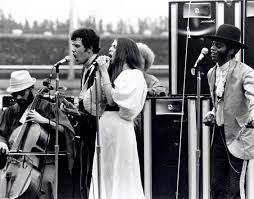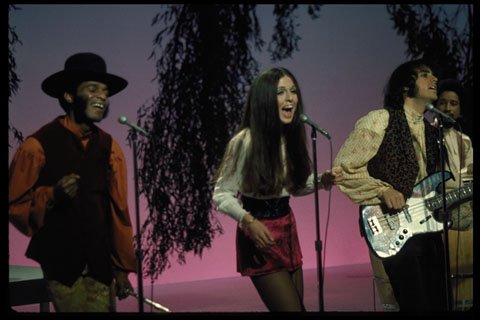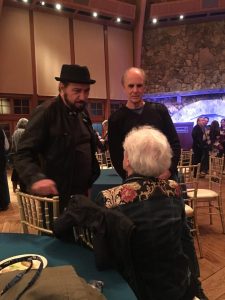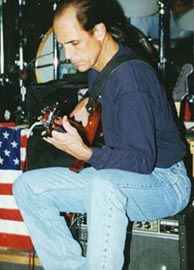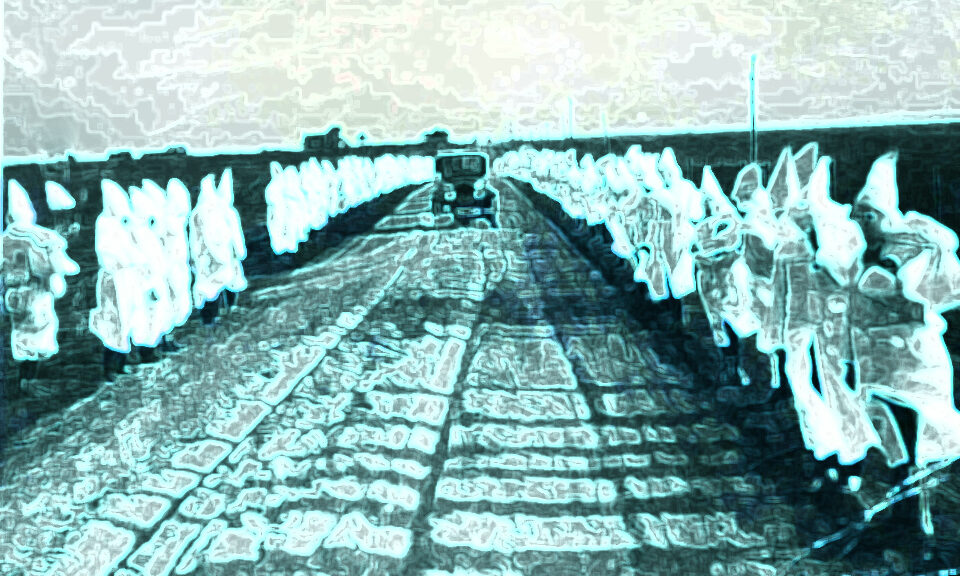February 21 Peace Love Art Activism
US Labor History
The Communist Manifesto
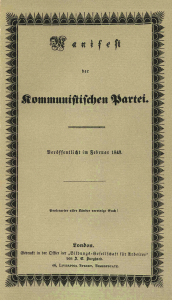
February 21, 1848: in London a group of German-born revolutionary socialists known as the Communist League published The Communist Manifesto. Karl Marx, with the assistance of Friedrich Engels, wrote it. The political pamphlet–arguably the most influential in history–proclaimed that “the history of all hitherto existing society is the history of class struggles” and that the inevitable victory of the proletariat, or working class, would put an end to class society forever. (text of Manifesto) (see April 12, 1858)
United Farm Workers
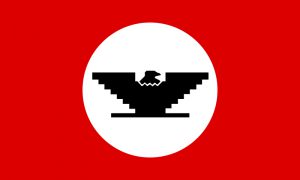
February 21, 1972, : the AFL-CIO granted a charter to César E. Chávez and Dolores Huerta’s United Farm Workers of America. (UFW, see Mar 25)
Oakland teacher strike
February 21, 2019: teachers in Oakland, California went on strike after rejecting the district’s latest offer to avoid a walkout.
Union President Keith Brown said the district proposed a raise of 7 percent over four years and a one-time bonus of 1.5 percent, up from its original offer of 5 percent over three years.
Brown said the latest offer failed to address the high cost of living that is driving teachers out of Oakland.
The union was demanding 12 percent over three years retroactive from 2017 to 2020. Teachers also wanted smaller class sizes, more counselors and full-time nurses. (see Mar 3)
February 21 Peace Love Art Activism
BLACK HISTORY
Nathaniel Gordon
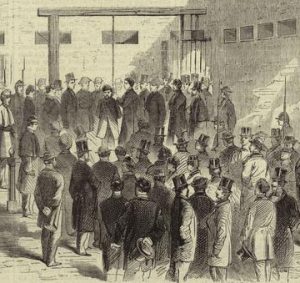
February 21, 1862: Nathaniel Gordon became the first and only American slave-trader to be executed under the U.S. Piracy Law of 1820 as he was hanged in New York.
On August 7, 1860, Gordon had loaded 897 slaves aboard his ship Erie at Sharks Point, Congo River, West Africa, “of whom only 172 were men and 162 grown women. Gordon… preferred to carry children because they could not rise up to avenge his cruelties.”
The USS Mohican captured the Erie on August 8, 1860. The slaves were taken to Liberia, the American colony established in West Africa by the American Colonization Society for the settlement of free blacks from the United States. (NYT archive article) (see Mar 24)
Wayman Caliman, Jr
February 21, 1947: students at Williams College in Massachusetts protested a barber in Williamstown who had tried to charge an African-American customer, Wayman Caliman, Jr., $3.00 for a haircut rather than the $1.00 he charged white customers. One of the protesting students was Norman Redlich, who went on to become a distinguished lawyer, member of the Warren Commission that investigated President Kennedy’s assassination, and Dean of New York University Law School. (see Apr 9)
Montgomery Bus Boycott
February 21, 1956: a Montgomery grand jury indicted 89 leaders of the boycott, including Dr. Martin Luther King, Jr. and Rev. Ralph Abernathy, for violating a 1921 state statute forbidding boycotts without “just cause.”
Grand jurors repudiated anti-segregation efforts in the grand jury report that accompanied the indictment. “In this state we are committed to segregation by custom and law; we intend to maintain it,” the grand jury wrote. “The settlement of differences over school attendance, public transportation and other facilities must be made within those laws which reflect our way of life.”
As the indicted boycott leaders surrendered themselves into custody at the police station, hundreds of African American supporters gathered outside in a show of support for their efforts to challenge racial discrimination and fight segregation in Alabama.
Of those indicted, only Dr. King was prosecuted. Despite defense evidence showing that the boycott was peaceful and that discriminatory bus service inflicted harm on the African American community, Dr. King was quickly convicted, fined $1000, and given a suspended jail sentence of one year at hard labor.
The indictment and Dr. King’s conviction strengthened local African Americans’ resolve to fight segregation and attracted national attention to the growing civil rights movement. (BH see Feb 24; see Montgomery for expanded story)
Free speech
February 21, 1961: the Rev. Ralph D. Abernathy’s car was sold at auction to help pay off his portion of a $500,000 libel judgment. (see (BH, see Mar 6; FS, see Mar 28)
Malcolm X
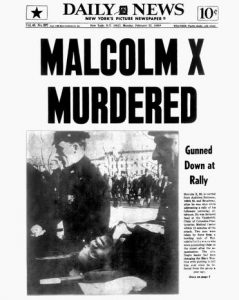
February 21, 1965: Malcolm X was shot and killed by assassins as he was about to address a rally in New York City; he was 39. (BH, see Feb 24; MX, see Feb 26)
Black Panthers
February 21, 1970: in New York City a cell of the Weather Underground fire-bombed the house of Judge Murtagh, who had presided over the Panther 21 trial . The same night, Molotov cocktails were thrown at a police car in Manhattan and two military recruiting stations in Brooklyn (2015 CNN article) (BH, see Apr 12; BP, see Aug 7; WU, see Mar 6)
Tulsa race riot
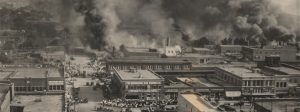
February 21, 2001: After the Oklahoma State Legislature authorized a commission to study the Tulsa Riot of 1921, (Tulsa history article) the report recommended actions for substantial restitution; in order of priority:
- Direct payment of reparations to survivors of the 1921 Tulsa race riot;
- Direct payment of reparations to descendants of the survivors of the Tulsa race riot;
- A scholarship fund available to students affected by the Tulsa race riot;
- Establishment of an economic development enterprise zone in the historic area of the Greenwood district; and
- A memorial for the reburial of the remains of the victims of the Tulsa race riot. (next BH, see Apr 3; next RR, see Apr 7); next Lynching, see October 10, 2003; for expanded chronology of lynching, see also AL4)
Malcolm X 2021
February 21, 2021: a letter written by ex-undercover NYPD policeman Raymond Wood alleged that his department and the FBI covered up details of the Malcolm X
Wood said that he was ordered to infiltrate the civil rights movement and had members of Malcolm X’s security detail arrested shortly before the killing by assassins identified as members of the Nation of Islam. Three men were convicted of murder and imprisoned, and all were eventually paroled.
“I participated in actions that in hindsight were deplorable and detrimental to the advancement of my own Black people. My actions on behalf of the New York City Police Department were done under duress and fear,” said Reggie Wood, a relative who read Raymond’s letter aloud at a press conference.
The letter said the security arrests carried out by Wood meant Malcolm X did not have security at the entrance to the Audubon Ballroom where he was speaking. [Aljaaeera article, Spectrum News article] (next BH, see Feb 23; next MX, see )
February 21 Peace Love Art Activism
LGBTQ
Ariston Hotel Baths
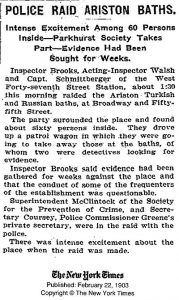
February 21, 1903: New York police conducted raid on a gay bathhouse, the Ariston Hotel Baths. 26 men were arrested and 12 brought to trial on sodomy charges; 7 men received sentences ranging from 4 to 20 years in prison.
Emma Goldman
In 1910. Goldman first began speaking publicly in favor of homosexual rights. Magnus Hirschfeld later wrote “she was the first and only woman, indeed the first and only American, to take up the defense of homosexual love before the general public.” (next LGBTQ, see June 4, 1920; see Goldman for her story)
Eric Rudolph
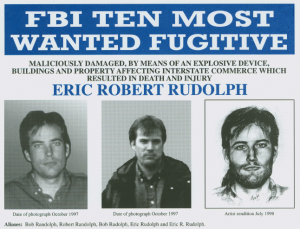
February 21, 1997: Eric Rudolph bombed the Otherside Lounge, an Atlanta lesbian bar, injuring five. (NYT article) (see Apr 30)
February 21 Peace Love Art Activism
Native Americans
Meriam Report
February 21, 1928: The Meriam Report (officially The Problem of Indian Administration) compiled information and reported of the conditions of American Indians across the country The report combined narrative with statistics to criticize the Department of Interior’s implementation of the Dawes Act (February 8, 1887) and overall conditions on reservations and in Indian boarding schools. The Meriam Report provided much of the data used to reform American Indian policy through new legislation: the Indian Reorganization Act of 1934. It strongly influenced succeeding policies in land allotment, education, and health care.
The report found generally that the US federal government was failing at its goals of protecting Native Americans, their land, and their resources, both personal and cultural. (complete text) (see June 18, 1934)
Same-sex marriage
February 21, 2015: the national debate over gay marriage prompted some Navajos to re-examine a 2005 tribal law called the Dine Marriage Act, which prohibited same-sex unions on the reservation. Among the tribal politicians who said they were amenable to repealing the law was Ben Shelly, president of the Navajo Nation, who said he would go along with a repeal if the Navajo Nation Council voted in favor of it. [NYT article] (LGBTQ, see Mar 2; NA, see Mar 30; Cherokee story, see December 9, 2016 )
February 21 Peace Love Art Activism
Technological Milestone

February 21, 1947: Edwin H. Land publicly demonstrated his Polaroid Land camera, which could produce a black-and-white photograph in 60 seconds. 4 lb. Polaroid Land Camera Model 95 was on sale at the Jordan Marsh department store in Boston for $89.75. It made more than $5 million in sales in the first year, and would be the prototype for Polaroid cameras for the next 15 years. [NYT obit for Land] (see Oct 5)
February 21 Peace Love Art Activism
Nuclear/Chemical Weapons News

February 21, 1958: in England, professor Gerald Holtom designed a nuclear disarmament symbol that became known as the peace symbol. Holtom was a professional artist and graduate of the Royal College of Arts in London. He was one of many intellectuals in Britain during the 1950’s who were deeply disturbed by witnessing the horrors of Hiroshima and Nagasaki, and then watching in disbelief as their own government, despite being in a time of post-war material hardship, raced to join the nuclear club. (next Nuclear, see Apr 4; see Holtom for his story)
February 21 Peace Love Art Activism
Vietnam
South Vietnam Leadership
February 21, 1965: the Armed Forces Council dismissed South Vietnam’s Gen Nguyen Khanh as chairman and as commander of the armed forces. General Lam Van Phat replaced him. (V & SVL, see Feb 27)
Henry Kissinger
February 21, 1970: National Security Advisor Henry Kissinger began secret peace talks at a villa outside Paris with North Vietnamese representative Le Duc Tho, the fifth-ranking member of the Hanoi Politburo. Le Duc Tho stated that the North Vietnamese position continued to require an unconditional U.S. withdrawal on a fixed date and the abandonment of the Thieu government as a precondition for further progress, which stalled the negotiations. The North Vietnamese rejected Kissinger’s proposals for a mutual withdrawal of military forces, the neutralization of Cambodia, and a mixed electoral commission to supervise elections in South Vietnam.
The talks were so secret that neither the secretary of state nor the secretary of defense nor the head of the CIA nor the Joint Chiefs of Staff had been told. (see Feb 25)
February 21 Peace Love Art Activism
February 21 Music et al
LSD
February 21, 1965: police raided Owsley Stanley’s makeshift LSD laboratory. He would beat the charges and successfully sued for the return of his equipment. The police were looking for methamphetamine, but found only LSD, which was not illegal at the time. (see March…July)
Future Woodstock Performers
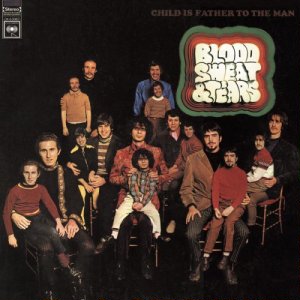
February 21, 1968: Blood, Sweat, & Tears released its first album, Child Is Father To the Man. Follow link to read more.(see July 1)
February 21 Peace Love Art Activism
The Cold War
February 21 > 28, 1972: President Richard M. Nixon arrived in China for an historic eight-day official visit. He was the first U.S. president to visit the People’s Republic of China since its founding in 1949.
The meeting between Nixon and Chinese Premier Zhou Enlai resulted in the Shanghai Communique, a pledge to set aside differences, especially on Taiwan, and to begin the process of the normalization of relations. (2012 Washington Post story) (see June 4, 1974)
February 21 Peace Love Art Activism
Watergate Scandal
February 21, 1975: former US Attorney General John N. Mitchell, and former White House aides H. R. Haldeman and John Ehrlichman, were sentenced to between 30 months and 8 years in prison. (see Watergate for expanded story)
February 21 Peace Love Art Activism
Cannabis
February 21, 1978: New Mexico Gov. Jerry Apodaca signed into law a bill to legalize the use of marijuana for medical purposes under very limited circumstances. The measure was based on evidence that marijuana helps relieve advese side effects of cancer chemotherapy and the painful effects of glaucoma. The first beneficiary of the law was Lynn Pierson, a 26‐year‐old student who said he had been using marijuana since 1976 to ease the effects of chemotherapy for treatment of lung cancer. [NYT article] (next Cannabis, see May 1985 or see CCC for expanded chronology)
February 21 Peace Love Art Activism
AIDS & Ryan White
February 21, 1986: White returned to school. A different judge grants a restraining order that afternoon to again bar him. (see White for his expanded story)
February 21 Peace Love Art Activism
Sexual Abuse of Children
John Geoghan
February 21, 2002: John Geoghan sentenced to 9-10 years in prison as the archdiocese continues to reel from the scandal. The extent of the cover-up and the sheer number of priests involved has shocked Boston’s large Catholic community, leading to calls for Cardinal Bernard Law to step down. Meanwhile, new cases are being reported in several other states. (see April 8)
Church summit
February 21, 2019: Pope Francis opened a historic summit meeting devoted to the scourge of child sexual abuse, an issue that had for decades devastated and eroded faith in some corners of his vast church while being utterly ignored and denied in others.
“We hear the cry of the little ones asking for justice,” he said. “The holy people of God look to us and expect from us not simple and obvious condemnations, but concrete and effective measures.”
Bringing together church leaders from around the world at the Vatican, Francis said that the church was obliged to discuss the extent to which abuse was afflicting the church and humanity in a “sincere and in-depth manner.” [NYT article] (see Apr 23)
February 21 Peace Love Art Activism
Women’s Health
February 21, 2014: the U.S. 7th Circuit Court of Appeals in Chicago ruled against the University of Notre Dame in a case over parts of the federal health care law that forces it to provide health insurance for students and employees that covers contraceptives. The court upheld a federal judge’s earlier ruling that denied the Roman Catholic school’s request for a preliminary injunction that would prevent it from having to comply with the birth control requirement as the university’s lawsuit moves forward. [SBT article] (see Mar 4)
February 21 Peace Love Art Activism
Immigration History
DHS memoranda
February 21, 2017: the Department of Homeland Security (DHS) released a set of memoranda regarding illegal immigrants.
- One document stated that , “The Department will no longer exempt classes or categories of removable aliens from potential enforcement.”
- Another expanded Immigration and Customs Enforcement’s ability to perform expedited removals on people who have been living in the U.S. for up to two years.
- The U.S.would also prosecute the parents of unaccompanied minors as smugglers.
- DHS directed ICE to hire 10,000 additional people to get the job done.
- the priority remained “removable aliens” who have been convicted of a crime or charged with a crime.
- It did not suggest any changes to the Deferred Action for Childhood Arrivals program, or DACA. [NYT article] (see Mar 6)
Greyhound buses & Border Patrol
February 21, 2020: ABC news reported that Greyhound, the nation’s largest bus company, had announced that it would stop allowing Border Patrol agents without a warrant to board its buses to conduct routine immigration checks.
The company’s announcement came one week after The Associated Press reported on a leaked Border Patrol memo confirming that agents can’t board private buses without the consent of the bus company. Greyhound had previously insisted that even though it didn’t like the immigration checks, it had no choice under federal law but to allow them. (next IH, see Feb 28)
February 21 Peace Love Art Activism
Crime and Punishment
February 21, 2018: in Murphy v Smith et al, by a 5-to-4 vote that divided the justices along ideological lines, the US Supreme Court ruled that prisoners who win civil rights suits must pay 25 percent of the damages they recover toward awards of attorney’s fees.
The case concerned Charles Murphy, an Illinois inmate badly beaten by prison guards, who crushed his eye socket. Murphy sued the guards, winning about $307,000 and $108,000 in attorney’s fees. [Oyez article] (see Feb 28)
February 21 Peace Love Art Activism
